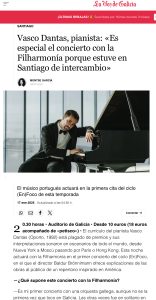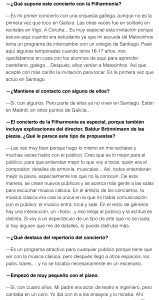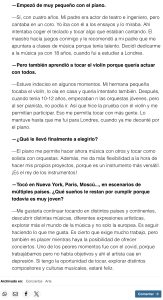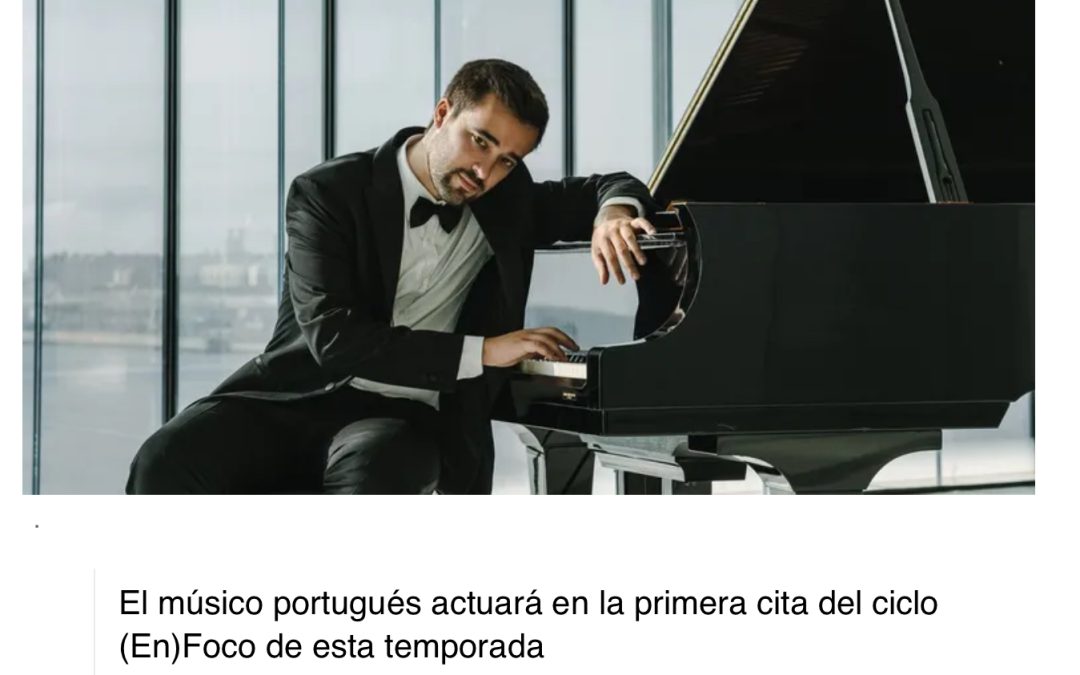The Portuguese musician will perform in the first date of the (En)Foco cycle of this season
8:30 p.m. • Auditorio de Galicia • From 10 euros (18 euros accompanied by a “petisco”) • The curriculum of the pianist Vasco Dantas (Oporto, 1992) is full of awards and his performances have been heard on stages all over the world, from New York to Moscow, via Paris or Hong Kong. Tonight you will perform with the Philharmonic Orchestra in the first concert of the (En)Foco cycle, in which the conductor Baldur Brönnimann offers explanations of the works to the public from a repertoire inspired by America.
—What does this concert with the Philharmonic Orchestra mean?
—It is my first concert with a Galician orchestra, although it is not the first time I have played in Galicia. The other times were solo in recitals in Vigo, A Coruña… This invitation is very special because I was here when I was a student since my school in Matosinhos had an exchange program with a school in Santiago. I spent some seasons here when I was 16-17 years old, we stayed at home with the students from here to learn Spanish, Galician… Afterwards, they came to Matosinhos. So I accepted the invitation to play with more affection. It is the first time I have performed in Santiago.
—Do you keep in touch with any of them?
—Yes, with some. But some of them no longer live in Santiago. They are in Madrid, in other parts of Galicia…
—The Philharmonic concert is special, because it also includes explanations of the pieces by the director, Baldur Brönnimann. What do you think of this type of proposal?
—I think it is very good because I do the same in my recitals and I often talk to the audience. I think it is the best for the audience, so that they understand better what I am going to play, who the composer was, details of harmony, musicals… In this way, everyone will understand the piece better, especially those who do not know it. In this way, new audiences are created and more people come to the halls to listen to classical music. In the field of concerts, classical music was almost the only one in which there was no communication with the audience: the musician enters, plays and leaves. In the other genres there is an interaction, a “hello”, and that relaxes the audience and the attitude is different. If I go to a show of a type of art that I know nothing about, if there is someone who gives me details, I can enjoy it more.
—What stands out about the concert repertoire?
—It is an attractive programme for any audience because it is related to classical music, but then it reached other spaces, pubs, bars…; and it was not necessarily played on stage.
—You started very young with the piano.
—Yes, when you were four years old. My father was a theatre actor and engineer, but he sang in a choir. I went with him to rehearsals and watched him. There I tried to take the keyboard and play something they were singing. The teacher played games with me and recommended to my father that I sign up for music classes because I had talent. I decided to dedicate myself to music when I was 18, when I went to study in London.
—But you also learned to play the violin because you wanted to perform with everyone.
—I was undecided at times. My little sister played the violin, I heard her at home and wanted to try it too. Then, when I was 10-12 years old, they started in youth orchestras, but being a pianist, I couldn’t go. So I tried out for the violin and they allowed me to participate. That allowed me to play with more people. I kept it up until I left for London, when I finally opted for the piano.
—What made you finally choose it?
—The piano allows me to make music with others now and play as a soloist with orchestras. In addition, it gives me more flexibility when it comes to doing my own projects, because it is a more versatile instrument. It is the king of instruments!
—You played in New York, Paris, Moscow…, on stages in multiple countries. What dreams do you still have to fulfill because you are still very young?
—I would like to continue playing in different countries and continents, discover different music, different artistic expressions, explore more of the world of music and not just European music. It is about continuing to do what I like. It is true that it requires a lot of work, but it is also a pleasure as long as there is the possibility of giving concerts. One of the worst moments was with Covid, because we worked but there were no objectives and then the artist falls into depression. If I have the opportunity to play, explore different composers and musical cultures, I will be happy.
– –
Vasco Dantas, pianista: «Es especial el concierto con la Filharmonía porque estuve en Santiago de intercambio»
El músico portugués actuará en la primera cita del ciclo (En)Foco de esta temporada
17 ene 2025 . Actualizado a las 04:55 h.
20.30 horas • Auditorio de Galicia • Desde 10 euros (18 euros acompañado de «petisco») • El currículo del pianista Vasco Dantas (Oporto, 1992) está plagado de premios y sus interpretaciones sonaron en escenarios de todo el mundo, desde Nueva York a Moscú pasando por París o Hong Kong. Esta noche actuará con la Filharmonía en el primer concierto del ciclo (En)Foco, en el que el director Baldur Brönnimann ofrece explicaciones de las obras al público de un repertorio inspirado en América.
—¿Qué supone este concierto con la Filharmonía?
—Es mi primer concierto con una orquesta gallega, aunque no es la primera vez que toco en Galicia. Las otras veces fue en solitario en recitales en Vigo, A Coruña… Es muy especial esta invitación porque estuve aquí cuando era estudiante ya que mi escuela de Matosinhos tenía un programa de intercambio con un colegio de Santiago. Pasé aquí algunas temporadas cuando tenía 16-17 años, nos quedábamos en casa con los alumnos de aquí para aprender castellano, galego… Después, ellos venían a Matosinhos. Así que acepté con más cariño la invitación para tocar. Es la primera vez que actúo en Santiago.
—¿Mantiene el contacto con alguno de ellos?
—Sí, con algunos. Pero parte de ellos ya no viven en Santiago. Están en Madrid, en otros puntos de Galicia…
—El concierto de la Filharmonía es especial, porque también incluye explicaciones del director, Baldur Brönnimann de las piezas. ¿Qué le parece este tipo de propuestas?
—Las veo muy bien porque hago lo mismo en mis recitales y muchas veces hablo con el público. Creo que es lo mejor para el público, para que entiendan mejor lo que voy a tocar, quién era el compositor, detalles de armonía, musicales… Así, todos entenderán mejor la pieza, especialmente los que no la conocen. De esta manera, se crean nuevos públicos y se acerca más gente a las salas para escuchar música clásica. En el ámbito de los conciertos, la música clásica era casi la única en la que no había comunicación con el público: el músico entra, toca y sale. En el resto de géneros hay una interacción, un «hola», y eso relaja al público y la actitud es distinta. Si voy a un espectáculo de un tipo de arte que no sé nada, si hay alguien que me dé detalles, lo puedo disfrutar más.
—¿Qué destaca del repertorio del concierto?
—Es un programa atractivo para cualquier público porque tiene que ver con la música clásica, pero después llegó a otros espacios, los pubs, bares…; y no se tocaba necesariamente en un escenario.
—Empezó de muy pequeño con el piano.
—Sí, con cuatro años. Mi padre era actor de teatro e ingeniero, pero cantaba en un coro. Yo iba con él a los ensayos y lo miraba. Ahí intentaba coger el teclado y tocar algo que estaban cantando. El maestro hacía juegos conmigo y le recomendó a mi padre que me apuntara a clases de música porque tenía talento. Decidí dedicarme a la música ya con 18 años, cuando fui a estudiar a Londres.
—Pero también aprendió a tocar el violín porque quería actuar con todos.
—Estuve indeciso en algunos momentos. Mi hermana pequeña tocaba el violín, lo oía en casa y quería intentarlo también. Después, cuando tenía 10-12 años, empezaban n las orquestas jóvenes, pero al ser pianista, no podía ir. Así que hice la prueba con el violín y me permitían participar. Eso me permitía tocar con más gente. Lo mantuve hasta que me fui para Londres, cuando ya me decanté por el piano.
—¿Qué le llevó finalmente a elegirlo?
—El piano me permite hacer ahora música con otros y tocar como solista con orquestas. Además, me da más flexibilidad a la hora de hacer mis propios proyectos, porque es un instrumento más versátil. ¡Es el rey de los instrumentos!
—Tocó en Nueva York, París, Moscú…, en escenarios de múltiples países. ¿Qué sueños le restan por cumplir porque todavía es muy joven?
—Me gustaría continuar tocando en distintos países y continentes, descubrir distintas músicas, diferentes expresiones artísticas, explorar más el mundo de la música y no solo la europea. Es seguir haciendo lo que me gusta. Es cierto que exige mucho trabajo, pero también es placer mientras haya la posibilidad de ofrecer conciertos. Uno de los peores momentos fue con el covid, porque trabajábamos pero no había objetivos y ahí el artista cae en depresión. Si tengo la oportunidad de tocar, explorar distintos compositores y culturas musicales, estaré feliz.
https://www.lavozdegalicia.es/noticia/santiago/2025/01/17/especial-concierto-filharmonia-estuve-santiago-intercambio/0003_202501S17C6993.htm




